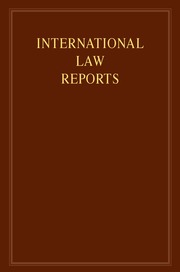No CrossRef data available.
Article contents
Lawless v. Government of the Republic of Ireland. (Merits.)
Published online by Cambridge University Press: 01 January 2021
Abstract
Treaties — Interpretation of — Consideration of preparatory work — Relevance of fact that preparatory work drawn up in several languages — European Convention on Human Rights.
The individual in international law — Human rights and freedoms — European Convention for Protection of — Right to liberty and security of person (Article 5) — Arrest and detention to restrain person from committing offence — Requirement that such deprivation of liberty be for purpose of bringing detainee before judicial authority (Article 5 (1) (c) and (3)) — Prohibition of retroactive criminal legislation (Article 7) — Applicability of Article 7 to detention as preventive measure — Right of Party to derogate from Convention in public emergency (Article 15) — Competence of Court to examine whether conditions for derogation fulfilled — Circumstances amounting to “public emergency threatening the life of the nation” — Requirement that measures taken should be “strictly required by the exigencies of the situation” — Relevance of safeguard provisions in statute authorizing detention of suspects-Relevance of existence of administrative body to which detainee could refer his case — Relevance of Government promise to release detainees on undertaking to observe law — Requirement of notification of measures to Secretary-General (Article 15 (3)) — Notification of reasons for measures — Exercise of protected rights and freedoms subject to Article 17 — Whether Article 17 operates to deprive person of rights guaranteed by Convention.
- Type
- Case Report
- Information
- Copyright
- © Cambridge University Press 1953


